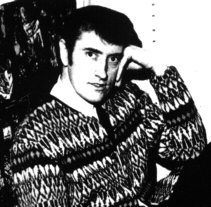|
1967 |
|
|
From a photo session in early '67 |
At the beginning of 1967, things seemed to be looking up a little. Although the Telstar case still wasn't settled, and money problems were piling up - Joe now owed some £15,000 - his lawyer was confident that the case was coming to a close, and the judgement would be in Joe's favour. In fact that had never really been in much doubt from the start as Ledrut's case was essentially based on seven notes played in a different key, tempo and context, but the French process of appeals had dragged everything out for five years. The case closing in Joe's favour may not have quite made him a millionaire, but it would have been close - by then "Telstar" had sold something like four million copies, and had been classified as a gold record since 1963. Certainly it would have paid off his creditors and given him plenty of cash to do pretty much whatever he wanted for the rest of his life. Which would no doubt have been making more records. |
|
He was in negotiations with Sir Joseph Lockwood, the head of EMI Records, to become their chief recording manager/producer, to replace George Martin, who was planning on leaving to run his own studio. In effect this would have put him in charge of the Beatles, and possibly producing, or at least working on, "Sergeant Pepper". A scary thought. In an unusual contractual twist, Lockwood had agreed to allow Joe to retain the studio at 304 and produce material independently as well. It was reputed to be a deal worth a cool million. |
|
|
Joe's lawyer was robbing Peter to pay Paul very efficiently and had already resolved several financial issues, no doubt with the promise of the income shortly to be received from the EMI deal and French case. Joe had even managed to pay off his backlog of overdue rent at 304. In late 1966 or very early 1967, he booked the holiday he'd always dreamed of - Egypt. Around January 31st he had his passport photographs taken, and he does look haggard in them. But other photos taken at a session only days before show him looking perfectly all right, or as "all right" as can be expected for a man suffering from chronic depression who detested being photographed. A little thinner than in the "Telstar" days and rather serious, but otherwise all right, and we all know how terrible passport photographs invariably are. While patiently waiting for time to pass until his holiday, Joe carried on recording; one of his last finished recording was of "Lips Are Redder On You", with the vocals of one Bobby Ross, bassist from The Offbeats, who had provided session backing some years before, and who had remained friends with Joe. It was a fine recording, mixed down to both stereo and mono, and Joe sent Bobby off to Europe around February 1st with an acetate to demo for Radio Luxembourg. |
|
|
On the evening of February 2nd 1967, a slightly edgy Joe invited his studio assistant, Patrick Pink, to record some vocals for him. He'd promised Pink many times that he would make a record with him, but had never got around to it. The recordings done, Pink left Joe still working on the track. |
|
|
When Pink resurfaced in the morning on February 3rd, he found Joe still working on the same recording. Not doubting he'd been doing it all night, Pink persuaded Joe to come and have some breakfast. The meal, toast and coffee, was short, then Joe disappeared back up to the control room. About 10.15am, Joe's landlady, Violet Shenton, went up to talk to him. While the rent was overdue, she had withheld Joe's tenant rent book and Pink is of the opinion that she and Joe were making arrangements for its return, and possibly remind him that she and her husband were planning to leave the building in July and he might need to find somewhere else to live and work. At the same time, her husband, Albert, was deep in discussion in the shop downstairs with a young estate agent, Jim Wilson, concerning exactly the same subject - the possible sale of the property. |
|
|
About 10.20am, Pink, Albert Shenton and Jim Wilson heard a bang. Shortly afterwards, they heard another. It's unclear who saw what, if anything, but Mrs. Shenton was found, barely alive and with a shotgun wound in her back, at the bottom or halfway down the second floor stairs. Joe was found on the landing above, killed instantly by a single shot to the head. Mrs. Shenton died on the way to the hospital. |
|
|
An inquest was held as is customary, and a verdict returned that Joe killed Mrs. Shenton and then shot himself. No cause for the tragic event was suggested, and it is even more unfathomable in light of the fact that Joe was very fond of Mrs. Shenton, and regarded the Shentons as a sort of substitute family; but then, the intent of an English inquest is to determine what happened - not why. |
|
|
A few short weeks later, a French court determined that Joe Meek had not plagiarised the work of an obscure French writer, whose name is barely remembered now, except by those RGM admirers who know him as the man who deprived Joe and The Tornados of what should have been a small fortune. Joe Meek died without making a will; all the royalties earned from sales of "Telstar" went straight to his creditors, accountants, lawyers and the Inland Revenue. Joe's family, and other people who should have benefited from it - the Tornados, Geoff Goddard, Dave Adams - never saw a penny. |
|
